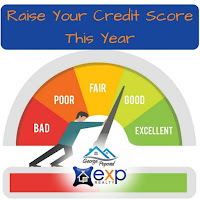Have you ever wondered what the term credit score is all about? Credit Score check tends to be low in Nigeria unlike in other countries because of lack of education. But in this guide, you will have an insight knowledge of what it's all about
A credit score a 3-digit numerical number usually between 300 - 850 that is based on a level analysis of a person's credit report, to represent the creditworthiness of an individual.
Most lenders also check credit scores, such as those produced by CRC Scores and VantageScore to determine how likely you are to repay the money you borrow and to help lower the risk posed by lending money to consumers and to mitigate losses due to bad debt.
What is a credit score?
Most lenders also check credit scores, such as those produced by CRC Scores and VantageScore to determine how likely you are to repay the money you borrow and to help lower the risk posed by lending money to consumers and to mitigate losses due to bad debt.
What is a credit history?
A credit history is a record of a borrowers responsible repayment of debts. If you have a credit card or a loan from any lender, you have a credit history. Companies collect information about your loans, credit cards and how you pay your bills. The put this information in one place known as your credit report.
What is a credit report?
A credit report is a summary of your credit history. It lists:
- Your name, address, and social security code
- Your loans
- Your credit cards
- The amount of debt you owe
- If you pay your bills on time or late.
Where can i see my credit report?
Companies such as CRC CreditBureau, TransUnion etc. collect, write, and keep a report (information) about you. You can get a free copy of your credit report every year from these 2 companies. If your country of residence is not included, you can search for your country credit reports agency via any search engines. You can also learn how to check your credit report.
Table of Contents
- What is a bad credit score
- 7 mistakes that can lower your credit score
- Side effects of a bad credit score
- Benefit of a good credit score
- How to get a loan with bad credit score
- How to fix/improve a bad credit score
- Conclusion
What is a bad/low credit score?
Having a bad or low credit score can be a hindrance: it make it more difficult to make obtain a loan from money lenders, and it can also affect other areas of life when it comes to finance.
Depending on the credit rating agency you ask and what region of the country you're in, the average credit score of CRC FICO score in Nigeria is between 650 - 699. This implies that a credit score below 650 is considered a bad or low credit score.
However, some companies consideres a score of between 625 - 649 to be a standard rating. The score range they reserve for subprime is 624 and below. If you are one of those unfortunate enough to have a score in the subprime category, there are things you can do to improve your credit rating. But before then, let's check out some 7 common mistakes that can lower your credit score.
7 common mistakes that can hinder your credit score
Click here to find out all the details concerning the 7 common mistakes people usually do that lowers their credit score. But here is a quick overview of the 7 mistakes people usually do:- Paying bills late
- Not paying the minimum amount required
- Keeping debt levels too high
- Owing too many credit cards
- Not alerting creditors if you've moved or change names
- Not periodically checking your credit report
- Not using your full legal name in financial documents.
Side effects of a bad or low credit score
Here are the disadvantages of having a bad credit score:
• Difficulty in getting a loan
Money lenders rely on credit rating as an essential element in loan decision-making, which means they will be less-inclined to lend money to people with bad credit score.
• High interest rates
In the eyes of loan lenders, people with bad credit rating represent more risk than people with high credit scores. As such, low credit scores that are approved are likely to be required to pay higher interest rates for the same loan than borrowers with high credit scores.
• Bad lenders
Some money lenders tends to capitalize on the desperation of loan applicants. This desperation makes loan seekers to urgently sign deals without reading and understanding the term's and conditions of the loan. So it is very wise to count on loansng.com to help get the best loans for you. You can contact us by clicking here.
Do you have a bad credit score? If yes, then worry no more. Here's how to catapult your bad credit score into a good credit score:
Your payment history is a record of your payment behavior on all credit accounts. It State whether you have derogatory marks for being late or defaulting of loans. It is the single biggest factor that influences your credit score.
If you have any questions, feel free to use the comments section below. And if you will like to get in touch with us use the contact us form below.
• Deposit
Lenders often requires loan applicants with bad credit rating to deposit any form of collateral or a guarantor before granting a loan to them.Benefits of a good credit score
Having a good credit rating comes with a huge benefits you can check it out here. But here is a break down of what you stands to gain if you have a good credit score:- Lower interest rates on loan
- Instant approval of loans
- Ability to obtain a loan without collateral
- Ability to obtain a loan at a higher amount
- Ability to earn a reputation of being a responsible person.
How to get a loan with bad credit score
Getting a lender that offer you loans with a bad credit score, and with low interest rates is not a days job. However, you can count on we Loansnigeria to help take the frustration out of selecting the right lender that will offer you loans with low or minimum interest rates for you.
Without wasting much of your time, here is a quick guide on how you can get loans with bad credit score:
- You can get a loan with bad credit score through online lenders
- Through banks and federal government
- Through credit union
- Through micro-finance
- Through peer-to-peer or mortgage lenders.
Please note: lenders will only offer you loans but with high interest rates with a fewer loan amount. So in order to get high loans with lower interest rates, you have to fix or improve your bad credit score.
More Useful Information
How to fix/improve a bad credit score
Do you have a bad credit score? If yes, then worry no more. Here's how to catapult your bad credit score into a good credit score:
1. Pay your loans at when due
When you borrow money try to pay before it's due date(s) or at when due, so as to help improve your credit rating. When you pay on time, it will reflect on your payment history.Your payment history is a record of your payment behavior on all credit accounts. It State whether you have derogatory marks for being late or defaulting of loans. It is the single biggest factor that influences your credit score.
2. High credit utilization
How much total credit you have available and how much of it you're actively using is known as your credit utilization ratio. Do your best to keep the amount of debt you owe low compared to your total credit limit. However if your credit cards are maxed out and you can't delete the balance, ask your lenders to increase your charging limit. If they do, don't add to the debt, instead, develop a plan to repay your debt.3. Length of credit history
Keeping old accounts open for a long time instead of closing it after they are paid off can help increase your credit history length. Learn how to close your account here.4. Types of credit in use
While you shouldn't apply for a new type of credit to influence a portion of your scores, it can naturally grow over time as you experience major financial events.5. Account/hard inquiry
Avoid not to hit your credit report with too many hard inquiries because it can make you seem risky to lenders.Conclusion
Before you get a loan with bad or low credit score, try to improve your credit rating in order to enable you to get higher loans with low interest rates.If you have any questions, feel free to use the comments section below. And if you will like to get in touch with us use the contact us form below.




